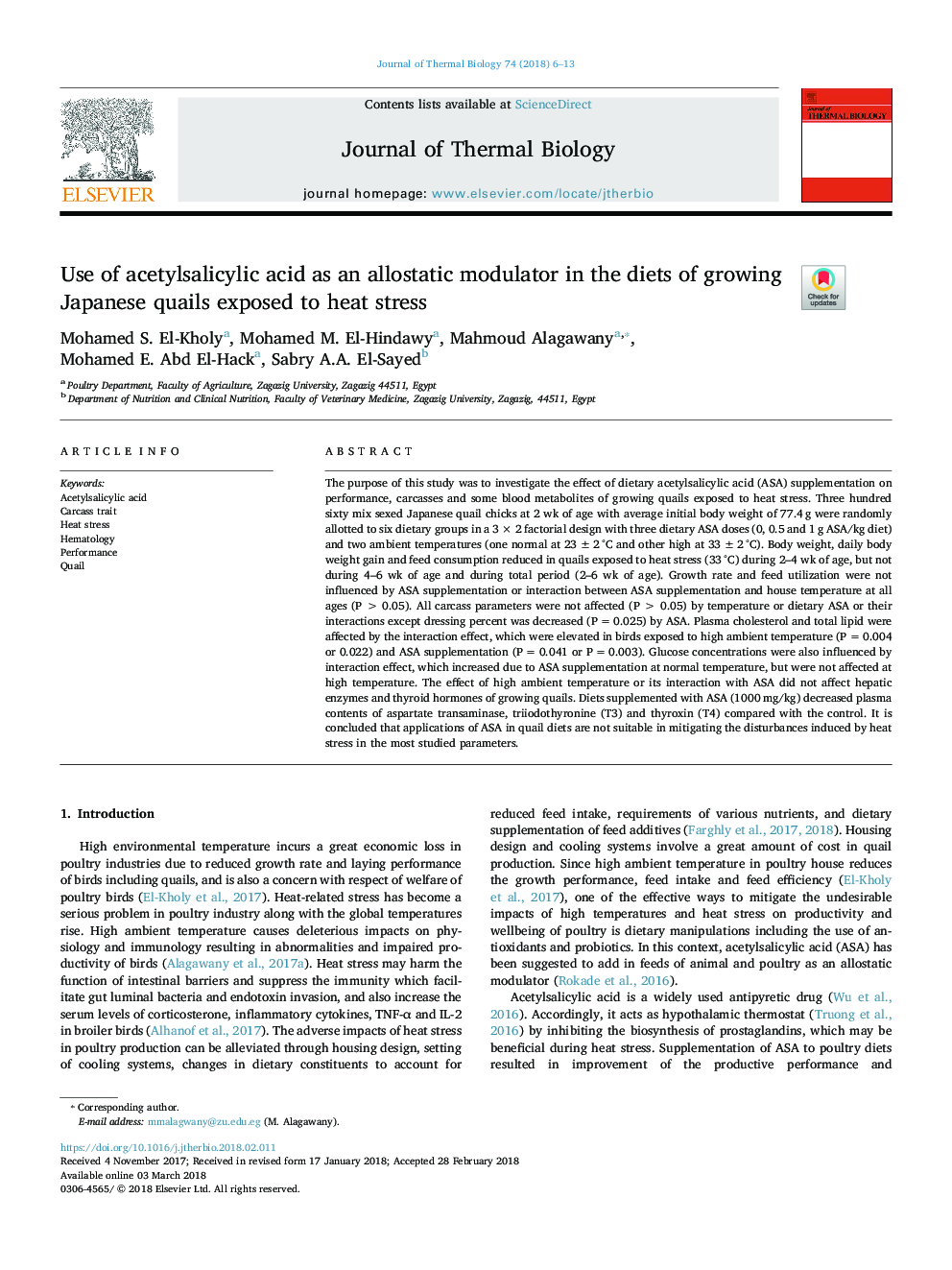| کد مقاله | کد نشریه | سال انتشار | مقاله انگلیسی | نسخه تمام متن |
|---|---|---|---|---|
| 8649990 | 1571073 | 2018 | 8 صفحه PDF | دانلود رایگان |
عنوان انگلیسی مقاله ISI
Use of acetylsalicylic acid as an allostatic modulator in the diets of growing Japanese quails exposed to heat stress
ترجمه فارسی عنوان
استفاده از اسید استیلسالیسیلیک به عنوان یک مدولاتور آلومینیومی در رژیم های غذایی رو به رشد جوجه های ژاپنی تحت تاثیر استرس گرما
دانلود مقاله + سفارش ترجمه
دانلود مقاله ISI انگلیسی
رایگان برای ایرانیان
کلمات کلیدی
اسید استیلسالیسیلیک، صفات لاشه، استرس گرما، هماتولوژی، کارایی، بلدرچین،
موضوعات مرتبط
علوم زیستی و بیوفناوری
علوم کشاورزی و بیولوژیک
علوم کشاورزی و بیولوژیک (عمومی)
چکیده انگلیسی
The purpose of this study was to investigate the effect of dietary acetylsalicylic acid (ASA) supplementation on performance, carcasses and some blood metabolites of growing quails exposed to heat stress. Three hundred sixty mix sexed Japanese quail chicks at 2 wk of age with average initial body weight of 77.4â¯g were randomly allotted to six dietary groups in a 3â¯Ãâ¯2 factorial design with three dietary ASA doses (0, 0.5 and 1â¯g ASA/kg diet) and two ambient temperatures (one normal at 23 ± 2â¯Â°C and other high at 33 ± 2â¯Â°C). Body weight, daily body weight gain and feed consumption reduced in quails exposed to heat stress (33â¯Â°C) during 2-4 wk of age, but not during 4-6 wk of age and during total period (2-6 wk of age). Growth rate and feed utilization were not influenced by ASA supplementation or interaction between ASA supplementation and house temperature at all ages (Pâ¯>â¯0.05). All carcass parameters were not affected (Pâ¯>â¯0.05) by temperature or dietary ASA or their interactions except dressing percent was decreased (Pâ¯=â¯0.025) by ASA. Plasma cholesterol and total lipid were affected by the interaction effect, which were elevated in birds exposed to high ambient temperature (Pâ¯=â¯0.004 or 0.022) and ASA supplementation (Pâ¯=â¯0.041 or Pâ¯=â¯0.003). Glucose concentrations were also influenced by interaction effect, which increased due to ASA supplementation at normal temperature, but were not affected at high temperature. The effect of high ambient temperature or its interaction with ASA did not affect hepatic enzymes and thyroid hormones of growing quails. Diets supplemented with ASA (1000â¯mg/kg) decreased plasma contents of aspartate transaminase, triiodothyronine (T3) and thyroxin (T4) compared with the control. It is concluded that applications of ASA in quail diets are not suitable in mitigating the disturbances induced by heat stress in the most studied parameters.
ناشر
Database: Elsevier - ScienceDirect (ساینس دایرکت)
Journal: Journal of Thermal Biology - Volume 74, May 2018, Pages 6-13
Journal: Journal of Thermal Biology - Volume 74, May 2018, Pages 6-13
نویسندگان
Mohamed S. El-Kholy, Mohamed M. El-Hindawy, Mahmoud Alagawany, Mohamed E. Abd El-Hack, Sabry A.A. El-Sayed,
